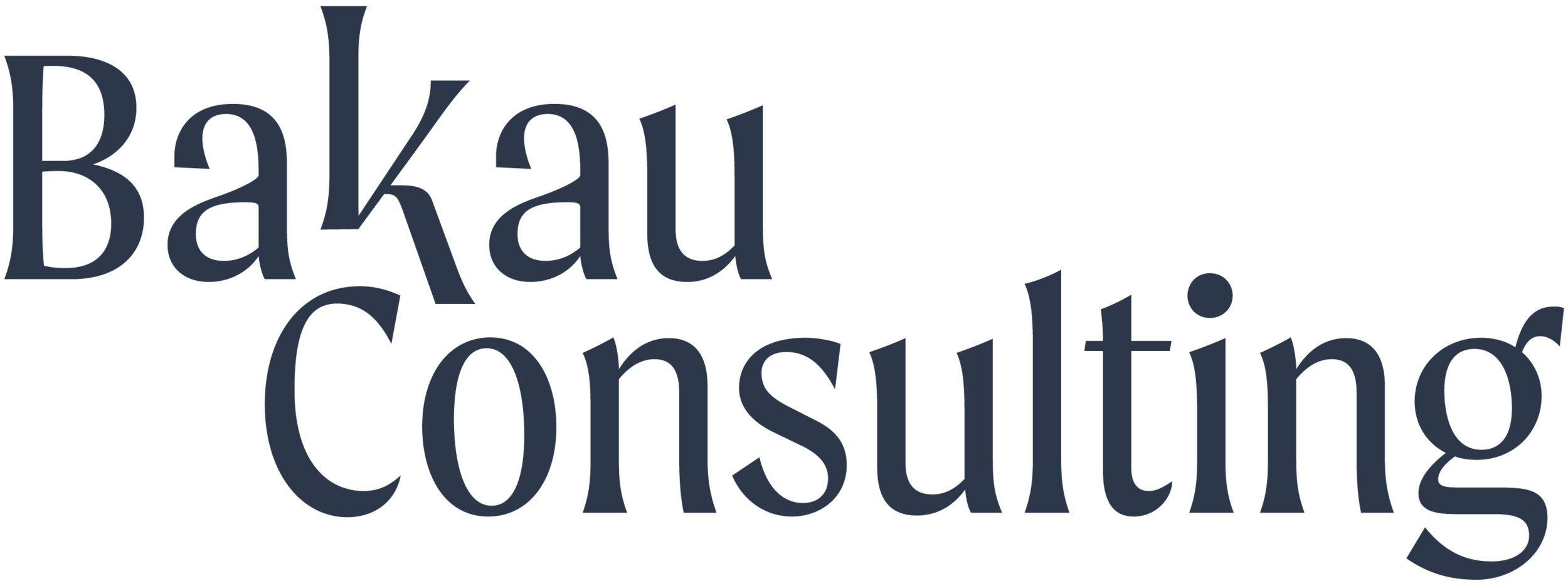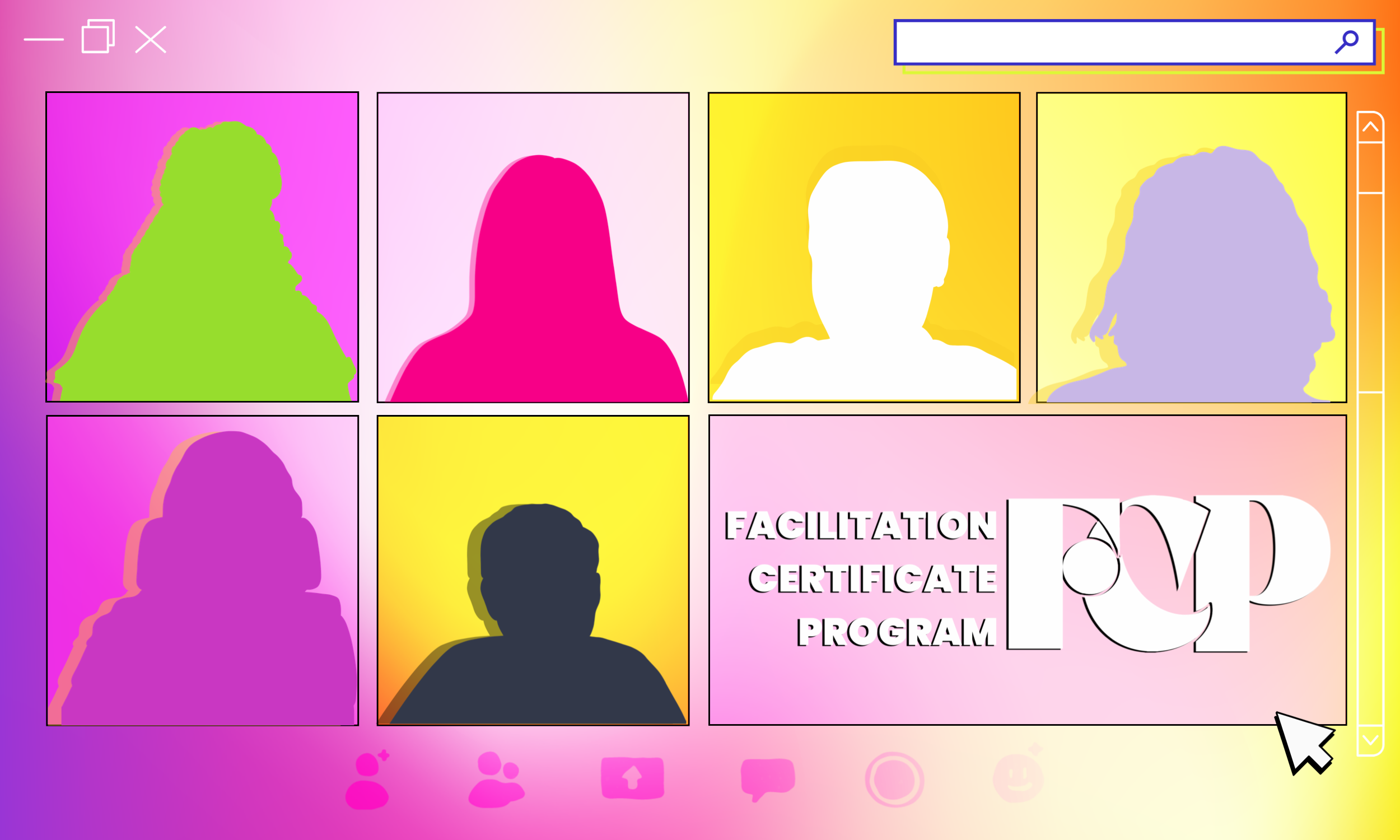Becoming an Inclusive Facilitator
By Tyne Johnson-Dhillon
Graphic: Mariana Trujillo-Lezama
Facilitation is a coveted skill. It combines diverse abilities including active listening, goal setting, communication, and fostering psychological safety, to navigate collaborative settings in the workplace and beyond. A skilled facilitator can be the wind in your sails, a guiding energy to steer teams through known and uncharted waters.
People often ask if we lead Train-the-Trainer workshops. In the past, we declined these requests since we knew single sessions would not properly teach the level of skill needed to be an effective and inclusive facilitator. Facilitation skills stem from lived experience, ample time, ongoing education and so much more. Then we had a realization: if learning meaningful facilitation skills is not achievable in mere hours then we could surely teach them over a matter of months.
In fall of 2021, we launched our 3-month online Facilitation Certification Program (FCP) with an emphasis on inclusivity, anti-oppression and social transformation. The inaugural cohort honed their unique facilitation style, preferences, boundaries and strategies through live classes, activities, discussion and dialogue, readings and a capstone presentation.
This skills-based program combines hands-on lessons and lived expertise from our team of Equity and Inclusion Strategists as well as guest instructors who support the learning journey. Instructors share lessons on:
Fundamentals of anti-oppressive, anti-racist, and gender and sexuality inclusive practices
Fundamentals of facilitation
Developing workshops
Accessible and decolonial practices
Navigating power dynamics and conflict
Creating safer spaces
Active listening and inclusive communication
At graduation, students receive a Certificate in Facilitation presented by Bakau Consulting.
Connections and reconnections
Becca Schwenk, Program Director and a Lead Instructor, had the opportunity to connect with some former students to reflect on their experiences with the FCP.
“I found the FCP so transformative, there are bits and pieces I can take away in all aspects of work and life,” says Letah Addison, Manager of Club Services at BGC South Coast BC. “I do a lot of work facilitating meetings and working with people so bringing in hard and soft skills lets me bring folks different opportunities and ways to be engaged.”
Starting a learning journey is a hopeful and exciting time but can often be one accompanied by feelings of anxiety and uncertainty – no matter the prior skills we may have.
Nicole Emanuel, Blogger and Advocate at Parenting While Black, says during an early group discussion on hopes and fears she discovered she was with a community of peers who had similar thoughts and feelings to hers.
“I realized that everyone had fears and it wasn't just me who was nervous about getting something wrong or saying something wrong or being wrong and not knowing enough,” she says. “I love how that conversation about fears let them out into the open, and that we could share them and help each other through them. I thought that created a sense of community that ran the thread of the entire course.”
Learning in community
The importance of learning in community and finding your unique style is central to the FCP. Refining the styles and methods most resonant to each individual promotes authenticity and fosters lasting community-building abilities. Students have opportunities to enhance their skills together in the virtual classroom and through optional one-on-one connections with instructors.
"The resources and content had so much value, there are so many things from the course I still go back to now."
“The resources and content had so much value, there are so many things from the course I still go back to now,” says Kathy Ma, who works as an Equity, Diversity, and Inclusion Consultant and Career Educator. “I’m still thinking about the FCP and to continue to integrate what I learned into my work.”
She says a big part of the learning was being present and letting go of a colonial education structure.
Community collaboration is central to the program. Becca and Shanique Kelly take the reins as lead instructors, and guests join throughout the program to deepen learning and share expertise in diverse topics.
For the pilot group, Ji-Youn Kim (Ji-Youn Kim Coaching & Counseling), Heather McCain (Creating Accessible Neighbourhoods) and Paisley Nahanee (Nahanee Creative Inc.) shared lessons on emotional processing, accessibility practices and decolonial facilitation methods, respectively.
Cicely Belle Blain, Koshiki Tanaka and Oakley Ramprashad from the Bakau Team also joined as guests to share lessons on responsible use of power, conflict mediation and locating patriarchy.
“I loved the fact that there were other facilitators who joined and brought in their own energy and knowledge,” says Sunaina Sharma, Principal at Silverlinings Strategy and Leadership Coaching and Consulting.
“It was such an incredible resource to have so many different experiences with people,” says Mandy McLean, Manager of Communications and Planning at BGC South Coast BC. “I felt like a sponge taking it all in – how they approached facilitating, how they connected you to the material and how they did it all in different ways.”
The FCP learning community creates a safer space to try out new facilitation skills and techniques, she says.
Actioning values
Inclusive facilitation skills development connects professional and personal growth. The FCP teaches facilitation through an enhanced understanding of anti-oppression, anti-racism, equity and inclusion to help participants thrive in the workplace and beyond.
“The FCP prepared me to be more inclusive as a facilitator because it prepared me to be just a better human in general by being able to start things with affirmations, centering other people, being inclusive and being more open to other people’s perspectives,” says Nicole.
Effective facilitators cultivate dignity and belonging in everyday settings. They are highly intentional people who know how to action their intentions where needed. Mindful reflection and sitting in discomfort are an important part of activating growth.
"I went into the FCP knowing I was going to learn but I didn't realize all the different ways I would be growing."
“I went into the FCP knowing I was going to learn but I didn’t realize all the different ways I would be growing,” says Mandy. “It felt uncomfortable in some ways but being open to the personal growth part of the program felt so good in the end.”
Letah says after the lessons she would connect with family and friends to reflect on what she had learned.
“Sharing within my inner circle has been really powerful.”
Facilitators are often navigating through lots of grey areas. Being comfortable with discomfort and finding ways to work through it expands how they can hold space for themselves and others.
Facilitating change
What does “being the change” look like? We believe in the power of actioning change through inclusivity in everyday settings.
An inclusive facilitator is ultimately an inclusive human. They are someone who strives to centre others, challenge the status quo and strive for equity.
Will everything always go as planned? Probably not. With time and practice it gets easier to shed ideas of perfectionism. Shifting focus towards other ways of being can cultivate real change in the workplace and beyond.
“Come with an open heart, open eyes and open mind,” Sunaina says to anyone considering the FCP. “Be open to what you learn and be open to other’s perspectives.”
Some quotes were edited for length and clarity.

